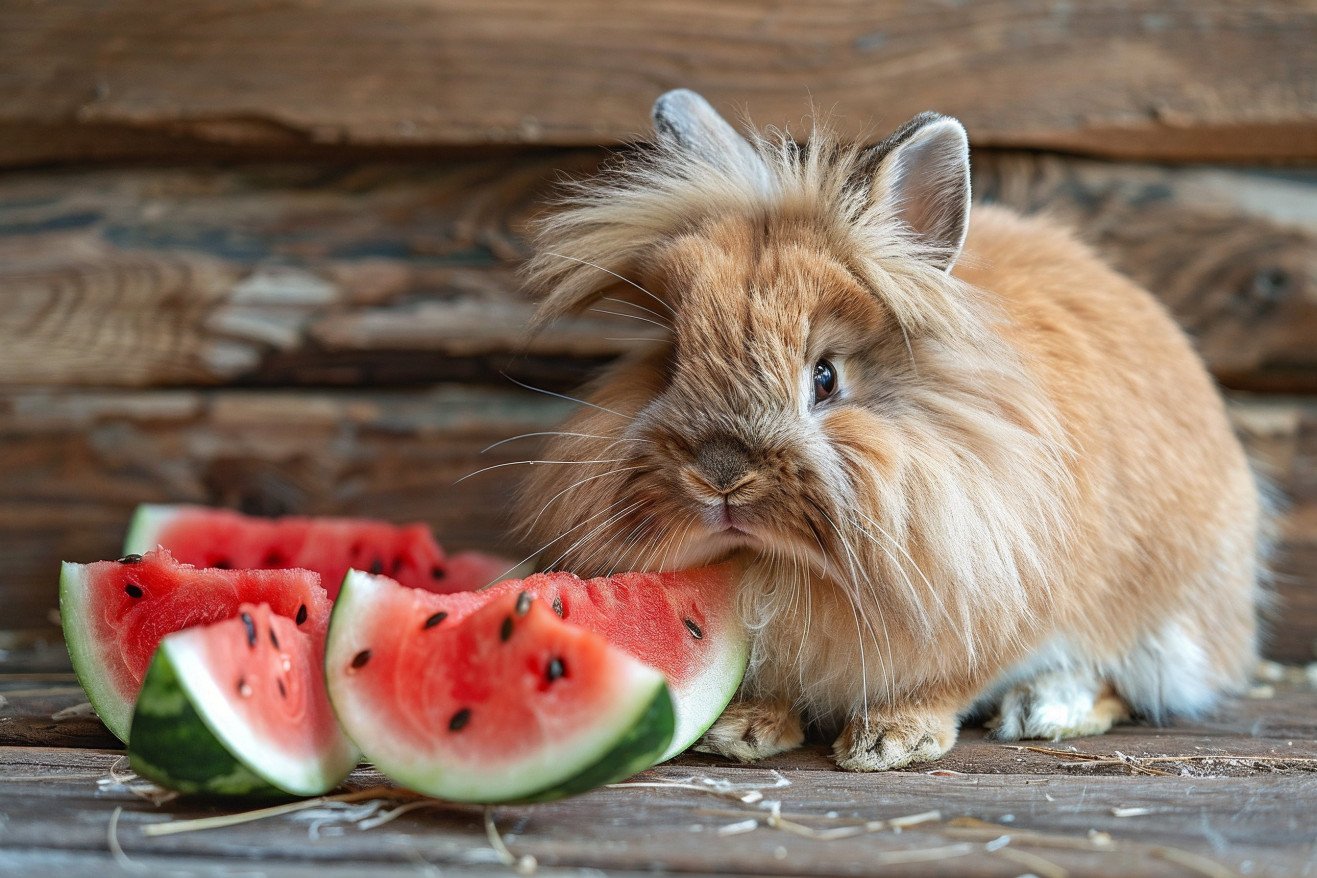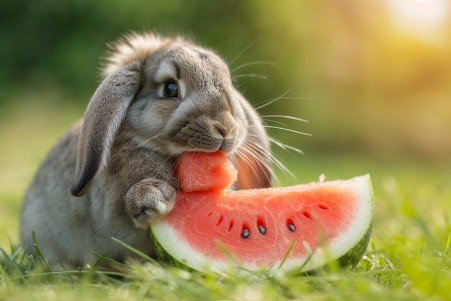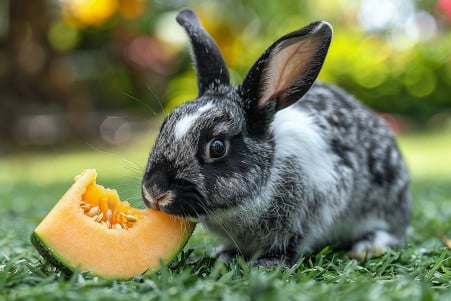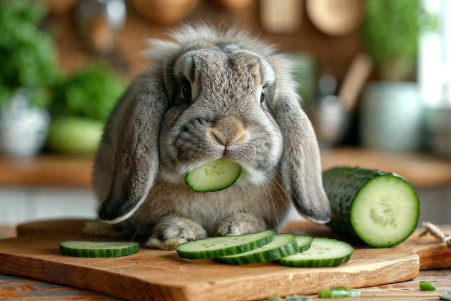Can Rabbits Eat Watermelon Rinds? Risks and Benefits Explained
28 May 2024 • Updated 28 May 2024

If you've ever eaten watermelon, you know that it's a sweet, hydrating fruit that's perfect for a hot summer day. But can you share this delicious snack with your pet rabbit? The good news is that you can, but there are some important things to know about the risks and benefits of feeding your rabbit watermelon rind.
Watermelon rind is safe for rabbits to eat and can help them stay hydrated and get the fiber they need. However, it's also high in sugar, so it's best to limit how often you give it to your rabbit and make sure it's not a regular part of their diet.
In this article, we'll explore what veterinarians and other experts have to say about the nutritional content and potential dangers of feeding watermelon rind to rabbits. We'll also discuss how eating watermelon rind can affect your rabbit's digestion and overall well-being, so you can decide whether or not to add this fruit waste to your rabbit's diet. This evidence-based information will help you make sure your rabbit is getting the best care possible.
Can rabbits eat watermelon rinds?
Nutritional Value of Watermelon Rinds for Rabbits
Watermelon rinds have several nutritional properties that can make them a good treat for rabbits in moderation. According to research published in ResearchGate, they are high in fiber, which can help with a rabbit's digestion. They also have a high water content and contain electrolytes like potassium, which can help rabbits stay hydrated, according to a video from Petbacker.nl.
Although they don't have as many vitamins and minerals as leafy greens, watermelon rinds do have some nutritional value. Best Friends Animal Society explains that they have vitamins A, C, and B6, as well as magnesium. This means that while watermelon rinds should be fed to rabbits in moderation, they can be a healthy addition to a diet that includes hay, fresh vegetables, and pellets.
That said, watermelon rinds should be fed to rabbits in moderation because they have a high water content and are high in sugar. As several sources point out, rabbits should only eat a small amount of watermelon rind to avoid the digestive upset that can come from eating too much sugar. If you control the portion size, watermelon rinds can be a fun way to mix up your rabbit's diet.
Portion Control and Feeding Tips
According to What About Watermelon?, watermelon rind should only be about 10% of a rabbit's diet. The recommended portion is 1-2 tablespoons of rind per 2 lbs of body weight, 1-2 times per week, as per The Spruce Pets.
When feeding watermelon rinds for the first time, it's important to start with a small amount and watch for any signs of digestive upset, such as diarrhea or gas, according to the RSPCA Knowledgebase. Make sure to remove any seeds from the rind to avoid potential intestinal blockages. Watermelon rinds should be considered a treat and not be used as a substitute for a rabbit's regular diet of hay, fresh vegetables, and pellets.
Can Baby Rabbits Eat Watermelon Rind?
It is not recommended to feed watermelon rind to baby rabbits that are less than 6 months old. This is because, as per Animal Hearted Apparel, their digestive systems are not yet fully developed and may not be able to handle the high sugar and water content of the rind, which can result in diarrhea, bloating, and other digestive issues.
For rabbits that are less than a year old, the The Spruce Pets suggests that you can try feeding them a small amount of watermelon rind and see how they react. However, as the RSPCA Knowledgebase points out, it is important to talk to a vet before adding any new foods to a baby rabbit’s diet to ensure that you are not putting their health at risk.
How to Introduce Watermelon Rinds to Your Rabbit
When you first give your rabbit watermelon rinds, it's important to give them a small piece, about 1-2 inches long. Animal Hearted Apparel also says that you should monitor your rabbit very closely for 12-24 hours after giving them watermelon rinds for the first time to make sure they don't have any digestive issues, like diarrhea or gas.
If your rabbit handles the small piece well, you can gradually increase the size of the piece over the next few days. Rabbit Talk says that a piece that's 1 inch wide and 4 inches long is a good size to aim for.
No matter how much you give your rabbit, it's important to make sure that you always wash the watermelon rinds thoroughly and cut them into small pieces before giving them to your rabbit. PetsHoods also warns that you should make sure that any seeds that are still in the rind are removed before you give it to your rabbit because they can be a choking hazard or cause an intestinal blockage if your rabbit eats them.
If you introduce watermelon rinds to your rabbit gradually and make sure that you prepare them properly, you can give your rabbit this hydrating, fibrous treat in moderation as part of a well-rounded diet. However, as we'll cover next, there are also some things to keep in mind when it comes to giving rabbits watermelon leaves and vines.
Do Watermelon Leaves and Vines Have Any Nutritional Value for Rabbits?
Watermelon leaves and vines can be eaten by rabbits, but they should be consumed in moderation, according to PetsHoods. The leaves can be a source of fiber, vitamins A and C, calcium, and iron that can be added to a rabbit's diet. That said, Rise and Shine Rabbitry points out that watermelon leaves are high in oxalates, so they should only be a small part of a rabbit's diet.
Meanwhile, some sources, including Rabbit Care Tips, suggest that you cook the leaves first to remove any toxins before giving them to rabbits. As always, it's important to introduce new foods to your rabbit gradually and watch for any adverse reactions when giving them watermelon leaves or vines. In general, you should make sure to keep the amount of watermelon leaves and vines that you give your rabbit in check to ensure that they can be part of a healthy, well-rounded diet.
Conclusion: Watermelon Rinds Can Be a Healthy, Occasional Rabbit Treat
Watermelon rinds can be a healthy, hydrating treat for rabbits if they are given in moderation. They are a good source of fiber, vitamins, and minerals, but their sugar content means that they should be fed in limited quantities.
It is important to stick to the recommended serving sizes based on the rabbit's weight and age. It is also important to introduce rinds gradually and make sure to remove any seeds to avoid digestive upset or blockages. When in doubt, consult a vet and make sure that hay remains the main component of a rabbit's diet.


